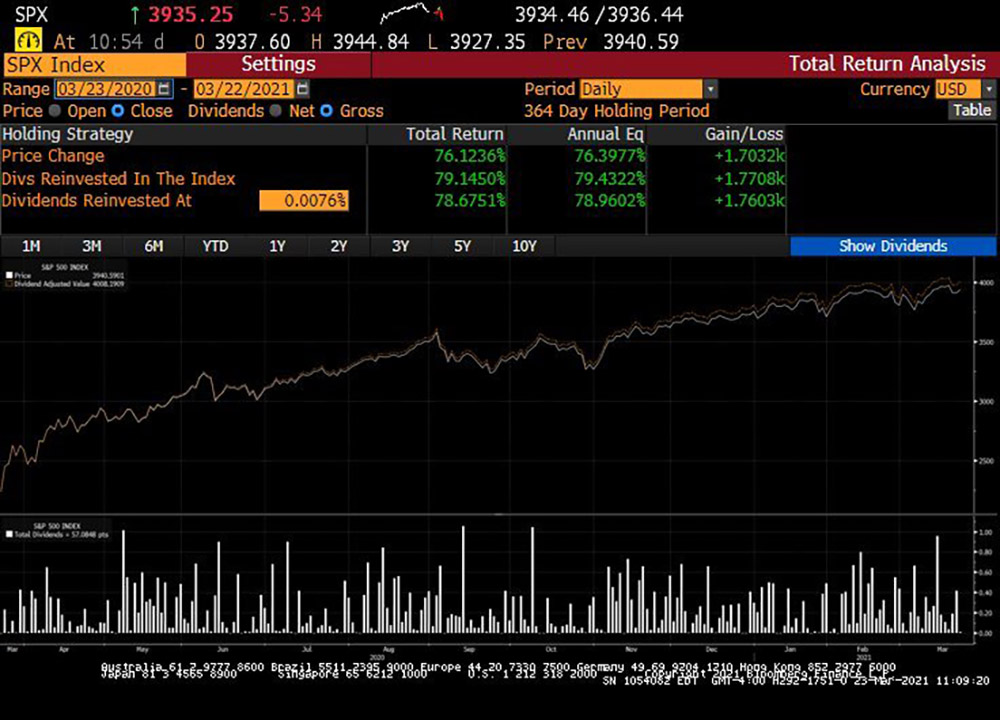一年前的今天,美國股市在短短24個交易日內(nèi)下跌了34%,,有史以來的最快暴跌也是在這段時間里發(fā)生的,,最終在2020年3月23日股市觸底。
不過在此之后,,美股的反彈趨勢也是驚人的,,甚至是歷史罕見的。截至3月22日收盤,,標(biāo)普500指數(shù)(S&P 500)已經(jīng)上漲了76%,,包含了大量科技股的納斯達(dá)克綜指(Nasdaq Composite)更是上漲了95%,,道指(Dow)也上漲了76%。(不過3月23日美股市場出現(xiàn)了大跌,,以上三個指數(shù)各自下跌了0.76%以上,。)

LPL金融公司(LPL Financial)于3月22日發(fā)布的一篇研究報(bào)告指出,這一年來,,美股的漲幅不僅驚人,,而且這也是歷史上從熊市反彈最強(qiáng)勢的一年(甚至超過了2009年68.6%的反彈幅度)。
這一年是美國股民豐收的一年,,但接下來,,美股會向何處去呢?
繼續(xù)“長?!钡睦碛?/strong>
獨(dú)立顧問聯(lián)盟公司(Independent Advisor Alliance)的首席投資官克里斯·扎卡雷利等專家對《財(cái)富》雜志表示:“之前的增長速度是很難復(fù)制的,,所以我們對2021年的預(yù)期已經(jīng)有所降低?!?/p>
不過扎卡雷利也指出,,他認(rèn)為股市仍然有很多利好因素,,“首先是財(cái)政刺激,其次,,美聯(lián)儲(Federal Reserve)出臺了大量貨幣寬松政策,并且放言接下來幾年,,短期利率都將維持在低水平。所以我們沒有看到任何會影響牛市的跡象,?!?/p>
瑞銀全球財(cái)富管理部門(UBS Global Wealth Management)的首席投資官馬克·海福樂也在3月23日的一篇文章中稱:“雖然股市一直處于牛市,而且疫情還沒有結(jié)束,,但我們認(rèn)為,,風(fēng)險(xiǎn)資產(chǎn)仍然有進(jìn)一步上漲的理由,?!?/p>
另外,,從歷史數(shù)據(jù)看,,在一個新牛市的第二年,,股市的情況通常還是比較樂觀的,。LPL公司的報(bào)告還指出,,自第二次世界大戰(zhàn)以來,,“有6個熊市的大盤至少跌了30%,而在每一次熊市之后的第一個牛市年里,,標(biāo)普500指數(shù)都會穩(wěn)步上漲,,第二年股市還會延續(xù)這種漲勢,,平均漲幅可達(dá)16.9%?!?/p>
不過,,LPL的這份報(bào)告也指出,這種增長并不一定是直線上升,。在新牛市的第二年,,出現(xiàn)回調(diào)也是正常現(xiàn)象,,平均回調(diào)幅度可達(dá)10.2%左右,。
目前,有些投資者仍然擔(dān)心通脹率有可能上升,,美聯(lián)儲的貨幣政策可能突然轉(zhuǎn)向,,或者稅收政策出現(xiàn)重大調(diào)整。與此同時,,很多投資者開始關(guān)注循環(huán)交易,,他們的目光已經(jīng)離開了那些在本輪牛市中反彈最強(qiáng)勢的科技股和成長型股票,,而是投向了價值股和周期性股票。
獨(dú)立顧問聯(lián)盟公司的首席投資官扎卡雷利說:“總之,,我們并不認(rèn)為今年的股市走向是一條直線,。但我們也并非覺得股市估值過高了,該到了崩盤或者熊市的時候了,。我們認(rèn)為這里還有一些投資的空間,。”(財(cái)富中文網(wǎng))
譯者:樸成奎
一年前的今天,,美國股市在短短24個交易日內(nèi)下跌了34%,,有史以來的最快暴跌也是在這段時間里發(fā)生的,最終在2020年3月23日股市觸底,。
不過在此之后,,美股的反彈趨勢也是驚人的,甚至是歷史罕見的,。截至3月22日收盤,,標(biāo)普500指數(shù)(S&P 500)已經(jīng)上漲了76%,,包含了大量科技股的納斯達(dá)克綜指(Nasdaq Composite)更是上漲了95%,道指(Dow)也上漲了76%,。(不過3月23日美股市場出現(xiàn)了大跌,,以上三個指數(shù)各自下跌了0.76%以上。)
LPL金融公司(LPL Financial)于3月22日發(fā)布的一篇研究報(bào)告指出,,這一年來,,美股的漲幅不僅驚人,而且這也是歷史上從熊市反彈最強(qiáng)勢的一年(甚至超過了2009年68.6%的反彈幅度),。
這一年是美國股民豐收的一年,,但接下來,美股會向何處去呢,?
繼續(xù)“長?!钡睦碛?/strong>
獨(dú)立顧問聯(lián)盟公司(Independent Advisor Alliance)的首席投資官克里斯·扎卡雷利等專家對《財(cái)富》雜志表示:“之前的增長速度是很難復(fù)制的,所以我們對2021年的預(yù)期已經(jīng)有所降低,?!?/p>
不過扎卡雷利也指出,他認(rèn)為股市仍然有很多利好因素,,“首先是財(cái)政刺激,其次,,美聯(lián)儲(Federal Reserve)出臺了大量貨幣寬松政策,,并且放言接下來幾年,,短期利率都將維持在低水平。所以我們沒有看到任何會影響牛市的跡象,?!?/p>
瑞銀全球財(cái)富管理部門(UBS Global Wealth Management)的首席投資官馬克·海福樂也在3月23日的一篇文章中稱:“雖然股市一直處于牛市,而且疫情還沒有結(jié)束,,但我們認(rèn)為,,風(fēng)險(xiǎn)資產(chǎn)仍然有進(jìn)一步上漲的理由?!?/p>
另外,,從歷史數(shù)據(jù)看,在一個新牛市的第二年,,股市的情況通常還是比較樂觀的,。LPL公司的報(bào)告還指出,自第二次世界大戰(zhàn)以來,,“有6個熊市的大盤至少跌了30%,,而在每一次熊市之后的第一個牛市年里,標(biāo)普500指數(shù)都會穩(wěn)步上漲,,第二年股市還會延續(xù)這種漲勢,,平均漲幅可達(dá)16.9%?!?/p>
不過,,LPL的這份報(bào)告也指出,這種增長并不一定是直線上升,。在新牛市的第二年,,出現(xiàn)回調(diào)也是正常現(xiàn)象,,平均回調(diào)幅度可達(dá)10.2%左右,。
目前,有些投資者仍然擔(dān)心通脹率有可能上升,,美聯(lián)儲的貨幣政策可能突然轉(zhuǎn)向,,或者稅收政策出現(xiàn)重大調(diào)整。與此同時,,很多投資者開始關(guān)注循環(huán)交易,,他們的目光已經(jīng)離開了那些在本輪牛市中反彈最強(qiáng)勢的科技股和成長型股票,而是投向了價值股和周期性股票,。
獨(dú)立顧問聯(lián)盟公司的首席投資官扎卡雷利說:“總之,,我們并不認(rèn)為今年的股市走向是一條直線。但我們也并非覺得股市估值過高了,該到了崩盤或者熊市的時候了,。我們認(rèn)為這里還有一些投資的空間,。”(財(cái)富中文網(wǎng))
譯者:樸成奎
One year ago today, the markets had bled out 34% in just 24 trading days, including one of the fastest bear market drops ever, bottoming on March 23, 2020.
But since that trough, the rebound has been remarkable—and historic. The S&P 500 is up 76% as of March 22's close, while the tech-heavy Nasdaq Composite is up a massive 95%. The Dow, meanwhile, has gained 76%. (Stocks took a tumble on March 23, however, with each index down at least 0.76%.)
Not only are those numbers staggering, but they also represent the strongest one-year rebound from a bear market ever (even beating out 2009's big 68.6% one year rally), per an LPL Financial research report out March 22.
But after such a plentiful year for investors, where can the stock market go from here?
Reasons for “further upside”
Those like Chris Zaccarelli, chief investment officer at Independent Advisor Alliance, point out the obvious: "I think it's hard to replicate the speed of the move that we've just had, so I think our expectations are quite a bit tempered" for 2021, he tells Fortune.
But Zaccarelli notes he's seeing a lot of tailwinds for stocks, "whether it's the fiscal stimulus, the Federal Reserve providing lots of monetary accommodation and a pledge to keep short term interest rates low for an extended number of years," he says. "We really don't see anything to derail the bull market."
Indeed, others like UBS Global Wealth Management’s chief investment officer Mark Haefele agree that "despite the rally and the fact that the pandemic is still ongoing," he notes, "we see reasons for further upside in risk assets," Haefele wrote in a March 23 note.
What's more, based on historical data, things often look good for the second year of a fresh bull market. The LPL report notes that since World War II, "there have been six other bear-market declines of at least 30%, and in every single case the S&P 500 was up firmly the first year of a new bull market," while the "gains continued in year two, as stocks were also up the second year of a new bull market every single time—up a solid 16.9% on average," the LPL strategists wrote.
However, it's likely not going to be a straight shot up. Pullbacks are also common in the second year of a new bull market, the LPL strategists note, with an average 10.2% selloff.
Currently, worries of rising inflation, a sudden change in bond yields or the Fed's accommodative stance, and possible big tax policy changes are weighing on some investors' minds. Meanwhile, many on the Street have been leaning into the rotation trade, looking outside of the tech and growth stocks that were the strongest rebounders during this bull rally and focusing on value and cyclical stocks.
Ultimately, "We don't see it in a straight line," Independent Advisor Alliance's Zaccarelli argues of the trajectory of stocks this year, "but we're not of the camp that the market is so overvalued that it's due for a crash or a bear market. I think we have some room to run here."






